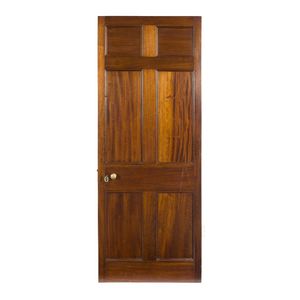Baltic Pine Campaign Side Cabinet from The Water Diviner
You must be a subscriber, and be logged in to view price and dealer details.
Subscribe Now to view actual auction price for this item
When you subscribe, you have the option of setting the currency in which to display prices to $Au, $US, $NZ or Stg.
- Signed or Stamped - A signed piece of furniture may mean that the maker has signed (and hopefully dated) the piece in the same way that we sign a cheque, but more likely, that it bears evidence of the name of the maker, wholesaler or retailer as a paper label, metal plaque, impressed into the timber or in later pieces after about 1880, stamped onto the timber with an ink stamp.
The 'signature' or stamp will always be in an unobtrusive position: under the top of a table, on the underside of the rails of a chair, inside a drawer or on the back.
The fact that a piece is 'signed' considerably enhances its value. Signed Australian furniture is extremely rare, and for imported furniture, it is a mark of quality of the item, as only the items by the top makers or retailers were 'signed' - Provenance - A term used to describe the provable history of an antique or work of art, and thus an additional aid to verifying its authenticity. Provenance can have an inflating effect on the price of an item, particularly if the provenance relates to the early settlement of Australia, a famous person, or royalty. Less significant are previous sales of the item through an auction house or dealer.
- Campaign Furniture - Most of the campaign furniture on the market is associated with the time of the British Empire in the 18th and 19th centuries when there was a high demand from military officers, administrators and colonists.
Campaign furniture is demountable, through clever use of wooden screws and sometimes metal hinges, so that it can disassembled and then packed into lots of manageable size for ease of movement by ship or animal between postings or camps.
This item has been included into following indexes:
Visually similar items

Mid century sideboard, nine drawers, teak, Australia, c 1960s, 61 cm high, 150 cm wide, 46 cm deep

A Biedermeier birch and ebonised chest of drawers, Austrian, circa 1820. 80 cm high, 98 cm wide, 50 cm deep. Provenance: Roy's Antiques, Melbourne

A Colonial Australian cedar door with lock and key, circa 1830, 197.5 cm high, 75.5 cm wide

An early 20th century Australian meat safe dresser 95 cm width, 47 cm depth, 178 cm high
